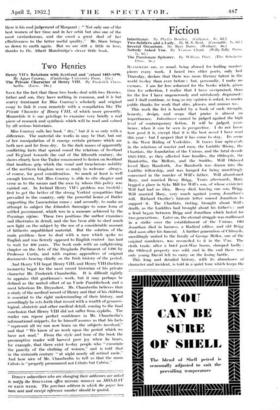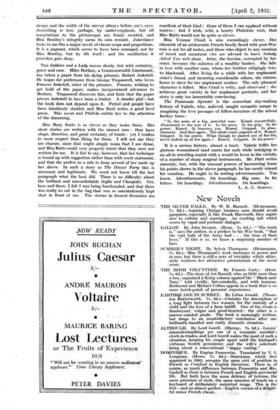Fiction
Inheritance. By Pits tis Bentley. (Collunez. 8s. 6d.) Hrvarwrt4 arc, as usual. being abused for hailing master- pieees every week. I heard two elder 'noels, only last Thursday. declare that there was more literary talent in the world to-day than ever before : but. personally, I make no excuses. I am far less ashamed fur the books which. given One for reflection, 1 realize that I have overpraised, than Mr the few 1 have ungenerously and mistakenly dispraised : and I shall continue, as long as my opinion is asked, to mini lei public thanks far work that stirs, pleases. and anuses me. This week the list is !tended by a book of such stivngth.
I sty, design, and scope that praise is alniost. an impertinence. Inheritance cannot be judged against the high level of contemporary lint' . IL will be judged, years hence, when it tan be seen in perspective. I do tad loam how good it is, except that it. is the best novel I have read this year : but. I suspect that it has emit, to stay. Its Weilo is the West Riding of Yorkshire. It traces four upheavals in the relations of master and man, the Luddite Rising. Iht.
Chartists, the foundation of the and the fatal dread.' 1921-1931, as they affected four families, the Oldroyds, the Bamforths, the Mellors, and the Smiths. Will Oldroyd lined Mary Bantam/h. Joe Ilsonfortli was drawn lido the Luddite fellowship, and was hanged for 1 unwittiagly concerned in the murder of Wilk father. %Vill abandoned Mary, and married Ilessy Brigg. Years afterwards, Mary begged a place in S■ lie Mill liar Will's son, of whose rxisi cam Will had had no idea. Ressy died, leaving one son, Brigg. Will married Mary, very much against young Jonathan's will. Richard (tastier's historic letter roused Jonathan to support • it. The Chartists. rioting, brought. about Will's death. as the Luddites Ind brought about his father's and a feud began between Brigg and Jonathan which lasted for two generations. Later on, the eternal struggle was reaffirmed in a strike over the establishment of the I 'nions. Old Jonathan died in harness, a Radical editor, and till Brigg died soon after his funeral. A further generation! 14 eldroyds. unwillingly united to the family of George Mellon., one if the original murderers, was reconciled to it in the War. The cloth trade, after a brief post-War boom. slumped badly : the Oldroyd property was sold, and in the end there was only young David left to carry on the losing battle.
This long and detailed history, with its abundanee of diameter and incident, is told in a quiet tone which keeps the design and the width of the survey always before one's eyes. Something is lost, perhaps, by ..under-emphasis,. but all temptations to the picturesque are firmly . resisted, and Miss Bentley's integrity earns its own reward. Inheritance looks to me like a major novel, of classic scope and proportions. It is a pageant, which seems to have been arranged, not by Miss Bentley, but by life itself : and the meditation it provokes goes deep.
• Two Soldiers and a Lady moves slowly, but with certainty, grace and ease. Miles Borlace, a Commonwealth Lieutenant, has taken a paper from his dying prisoner, Robert Anketell. He hopes for preferment from George Tregonwell, who loves Frances Anketell, sister of the prisoner. Frances, wishing to get hold of the paper, makes inexperienced advances to Borlace. Tregonwell discovers this, and finds that the paper proves Anketell to have been a traitor. A slender plot—but the book does not depend upon it. Period and people have been intuitively studied, and Miss Reid writes a good level prose. This novel and Phillida entitle her to the attention of the discerning.
Miss Mary Butts is as clever as they make them. Her short stories are written with the utmost care : they have shape, direction, and great certainty of touch : yet I confess to more respect than liking for them.. I will not say they are obscure, since that might simply mean that I am dense, and Miss Butts could very properly retort that they were not written for me. It is fair to say, however, that her technique is bound up with suggestion rather than with overt-statement, and that she prefers as a rule to keep several of her cards up her sleeve. In such a story as The Dinner Party this is necessary and legitimate. We must not know till the last paragraph what the host did. There is no difficulty about the brilliant and uncomfortable Scylla and Charybdis. Yet, here and there, I felt I was being bamboozled, and that there was really no cat in the bag that was so ostentatiously kept shut in front of me. The stories in Several Occasions are excellent of their kind : three. of them I can applaud without reserve : . but -I wish, with a hearty Philistine wish, that Miss Butts would not be quite so clever.
Miss Yvonne Cloud is also exceedingly clever. Her chronicle of an aristocratic French family faced with post-War ruin is not for all tastes, and those who object to any mention of incest and unnatural vice are advised to leave Nobody Asked You well alone. irkne, the heroine, corrupted by her sister, becomes the. mistress of a wealthy' banker. She falls in love with another man, whom her brother obligingly tries to blackmaiL After living for a while with her unpleasant sister's friend, and incurring considerable odium, she returns home to slave for her unpleasant mother. The only pleasant character is killed. Miss Cloud is witty, and observant : she achieves great variety in her unpleisant portraiti; and her story is only too lamentably convincing.
The Passionate Spinster is the somewhat shy-making history of Valerie, who, unloved, sought romantic escape in imagining the love passages of fellow-members of _the school hockey team : " In the- arms of a big, powerful man. Kissed unmercifully. Abandoned to the zest of it. In his arms. In his grip. In his power. Kissed. 0, heavens, yes. Kissed. Gripped. In aban- donment. And then again. The whole erotic pageant of it. Kissed. Gripped. In his power. What though he passed out. of her life. never looked up at her again ? Kissed. Gripped. In his power."
It is a serious history, almost tract. Valerie fulfils her glorious womanhood (and meets her end) while indulging in an all-in wrestling match with a would-be lover in the vicinity of number of sharp surgical instruments. Mr. Platt writes sincerely, but, with the unusual powers of hammering home his points shown in the above paragraph, he has surely missed his vocation. He ought to be writing advertisements. You . know. Advertisements. On hoardings. • Big ones. In fat letters. On hoardings. Advertisements. On hoardings. .
L. A. G. STRONG.

































 Previous page
Previous page